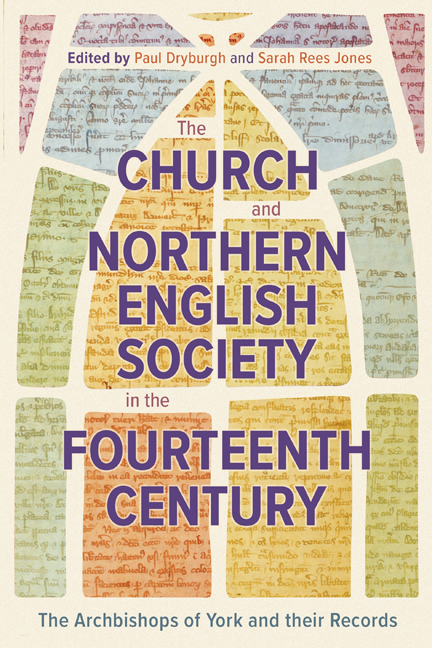 The Church and Northern English Society in the Fourteenth Century
The Church and Northern English Society in the Fourteenth Century Book contents
- Frontmatter
- Dedication
- Contents
- List of Illustrations
- List of Contributors
- Acknowledgements
- List of Abbreviations
- Map: The Ecclesiastical Province of York, c. 1304–1405
- Introduction
- 1 The Administrative Records of the Archbishops of York, 1304–1405
- 2 The Archbishops of York and the Government of Fourteenth-Century England
- 3 Support or Scourge? Archbishop William Melton and the Tradition of Loyal Opposition to the English
- 4 Beyond the Border: The Influence of York Clerks in the Two Edwards’ Scottish Administrations, 1332–1357
- 5 Responding to Royal Requirements: Clerical Taxation in the Province of York, 1304–1405
- 6 Ad insolenciam ipsius rebellis salubrius reprimendam: William Thorntoft, the Abbey of Rufford and Significations of Excommunication in the Northern Province
- 7 Blood, Sex and Holy Water: Reconciling Churches and Churchyards in the Medieval Diocese of York
- 8 Structuring Episcopal Authority: Palaces and Residences of the Archbishop of York
- 9 Medieval Parks of the Archbishops of York
- 10 Northern Ways? Pilgrimage, Politics and Piety in the Fourteenth-Century Administrative Records of the Archdiocese of York
- 11 Underexplored Sources for Gender History: New Approaches to the Fourteenth-Century York Archbishops’ Registers
- 12 Joan of Leeds and other Apostate Nuns in the Province of York, 1300–1350
- Bibliography of Records of the Archbishops of York, 1304–1405
- Index
6 - Ad insolenciam ipsius rebellis salubrius reprimendam: William Thorntoft, the Abbey of Rufford and Significations of Excommunication in the Northern Province
Published online by Cambridge University Press: 17 May 2024
- Frontmatter
- Dedication
- Contents
- List of Illustrations
- List of Contributors
- Acknowledgements
- List of Abbreviations
- Map: The Ecclesiastical Province of York, c. 1304–1405
- Introduction
- 1 The Administrative Records of the Archbishops of York, 1304–1405
- 2 The Archbishops of York and the Government of Fourteenth-Century England
- 3 Support or Scourge? Archbishop William Melton and the Tradition of Loyal Opposition to the English
- 4 Beyond the Border: The Influence of York Clerks in the Two Edwards’ Scottish Administrations, 1332–1357
- 5 Responding to Royal Requirements: Clerical Taxation in the Province of York, 1304–1405
- 6 Ad insolenciam ipsius rebellis salubrius reprimendam: William Thorntoft, the Abbey of Rufford and Significations of Excommunication in the Northern Province
- 7 Blood, Sex and Holy Water: Reconciling Churches and Churchyards in the Medieval Diocese of York
- 8 Structuring Episcopal Authority: Palaces and Residences of the Archbishop of York
- 9 Medieval Parks of the Archbishops of York
- 10 Northern Ways? Pilgrimage, Politics and Piety in the Fourteenth-Century Administrative Records of the Archdiocese of York
- 11 Underexplored Sources for Gender History: New Approaches to the Fourteenth-Century York Archbishops’ Registers
- 12 Joan of Leeds and other Apostate Nuns in the Province of York, 1300–1350
- Bibliography of Records of the Archbishops of York, 1304–1405
- Index
Summary
Across the medieval period, the administrations of Church and State were heavily intertwined, both in terms of procedure and personnel. Consequently, records relating to the English Church survive not only in the archives of the various dioceses and archdioceses, usually in county or regional archives, but also throughout the collections at TNA, the successor to the Public Record Office and archive for records created by and for the English (and later British) royal governments from the eleventh century onwards. Many of these appear in series already well known to historians: the vast rolls of Chancery contain thousands of examples of activities pertaining to church administration, from royal presentations to benefices, to the granting and collection of clerical taxation, while the Ancient Petitions (SC 8) and Ancient Correspondence (SC 1) are littered with requests and letters from clerics of all ranks. Many of these documents stemmed from, or led to, correspondence also recorded in the episcopal and archiepiscopal registers, often allowing events to be viewed from both sides, while others can provide additional stages in administrative processes, or record business never included in even the fullest and most detailed episcopal register or archive.
But there are also certain series within TNA's collections devoted specifically to the direct administrative interaction between Church and State. One such series, which has attracted relatively little attention from historians, is the Significations of Excommunication (C 85), which record attempts by the Church to employ the royal administrative machinery against its recalcitrant members. The process of excommunication was long-established, and its use lies well beyond the scope of this paper. It remained the ultimate sanction available to the medieval religious authorities, as it effectively severed individuals or groups from all contact with their church and, at least in theory, wider society. Not only could excommunicates no longer attend church services, but they could not be buried in holy ground, could not take part in other church or social activities, and even their own families were expected to shun them. The reasons behind an excommunication could be many and varied, but for all its power and influence, the medieval Church's ability to enforce its sanctions was limited.
- Type
- Chapter
- Information
- The Church and Northern English Society in the Fourteenth CenturyThe Archbishops of York and their Records, pp. 172 - 190Publisher: Boydell & BrewerPrint publication year: 2024


